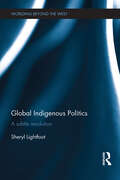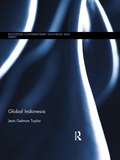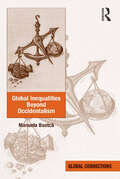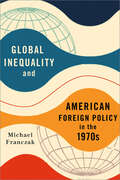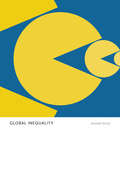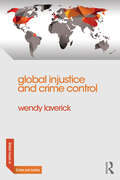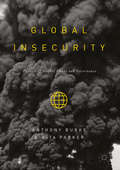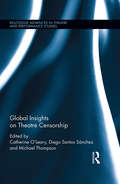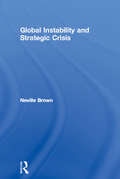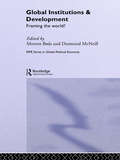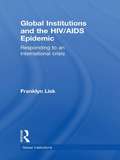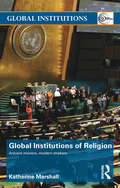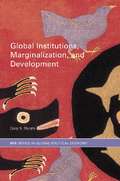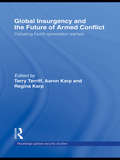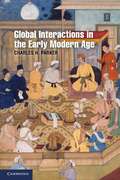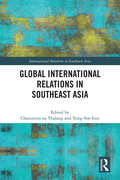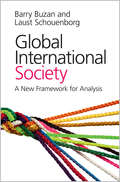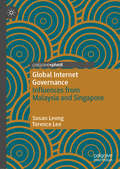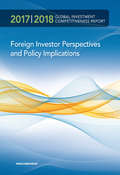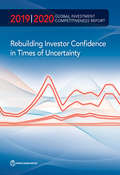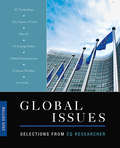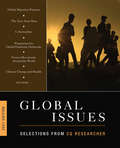- Table View
- List View
Global Indigenous Politics: A Subtle Revolution (Worlding Beyond the West)
by Sheryl LightfootThis book examines how Indigenous peoples’ rights and Indigenous rights movements represent an important and often overlooked shift in international politics - a shift that powerful states are actively resisting in a multitude of ways. While Indigenous peoples are often dismissed as marginal non-state actors, this book argues that far from insignificant, global Indigenous politics is potentially forging major changes in the international system, as the implementation of Indigenous peoples’ rights requires a complete re-thinking and re-ordering of sovereignty, territoriality, liberalism, and human rights. After thirty years of intense effort, the transnational Indigenous rights movement achieved passage of the UN Declaration on the Rights of Indigenous Peoples in September 2007. This book asks: Why did movement need to fight so hard to secure passage of a bare minimum standard on Indigenous rights? Why is it that certain states are so threatened by an emerging international Indigenous rights regime? How does the emerging Indigenous rights regime change the international status quo? The questions are addressed by exploring how Indigenous politics at the global level compels a new direction of thought in IR by challenging some of its fundamental tenets. It is argued that global Indigenous politics is a perspective of IR that, with the recognition of Indigenous peoples’ collective rights to land and self-determination, complicates the structure of international politics in new and important ways, challenging both Westphalian notions of state sovereignty and the (neo-)liberal foundations of states and the international human rights consensus. Qualitative case studies of Canadian and New Zealand Indigenous rights, based on original field research, analyse both the potential and the limits of these challenges. This work will be of interest to graduates and scholars in international relations, Indigenous studies, international organizations, IR theory and social movements.
Global Indonesia (Routledge Contemporary Southeast Asia Series)
by Jean Gelman TaylorIn the 19th century, colonial rule brought the modern world closer to the Indonesian peoples, introducing mechanized transport, all-weather roads, postal and telegraph communications, and steamship networks that linked Indonesia’s islands to each other, to Europe and the Middle East. This book looks at Indonesia’s global importance, and traces the entwining of its peoples and economies with the wider world. The book discusses how products unique to Indonesia first slipped into regional trade networks and exposed scattered communities to the dynamic influence of far-off civilizations. It focuses on economic and cultural changes that resulted in the emergence of political units organized as oligarchies or monarchies, and goes on to look in detail at Indonesia’s relationship with Holland’s East Indies Company. The book analyses the attempts by politicians to negotiate ways of being modern but uniquely Indonesian, and considers the oscillations in Indonesia between movements for theocracy and democracy. It is a useful contribution for students and scholars of World History and Southeast Asian Studies.
Global Inequalities Beyond Occidentalism (Global Connections)
by Manuela BoatcăBased on theoretical developments in research on world-systems analysis, transnational migration, postcolonial and decolonial perspectives, whilst considering continuities of inequality patterns in the context of colonial and postcolonial realities, Global Inequalities Beyond Occidentalism proposes an original framework for the study of the long-term reproduction of inequalities under global capitalism. With attention to the critical assessment of both Marxist and Weberian perspectives, this book examines the wider implications of transferring classical approaches to inequality to a twenty-first-century context, calling for a reconceptualisation of inequality that is both theoretically informed and methodologically consistent, and able to cater for the implications of shifts from national and Western structures to global structures. Engaging with approaches to the study of class, gender, racial and ethnic inequalities at the global level, this innovative work adopts a relational perspective in the study of social inequalities that is able to reveal how historical interdependencies between world regions have translated as processes of inequality production and reproduction. As such, it will be of interest to scholars of sociology, political and social theory and anthropology concerned with questions of globalisation and inequality.
Global Inequality and American Foreign Policy in the 1970s
by Michael FranczakIn Global Inequality and American Foreign Policy in the 1970s, Michael Franczak demonstrates how Third World solidarity around the New International Economic Order (NIEO) forced US presidents from Richard Nixon to Ronald Reagan to consolidate American hegemony over an international economic order under attack abroad and lacking support at home. The goal of the nations that supported NIEO was to negotiate a redistribution of money and power from the global North to the global South. Their weapon was control over the major commodities—in particular oil—that undergirded the prosperity of the United States and Europe after World War II.Using newly available archival sources, as well as interviews with key administration officials, Franczak reveals how the NIEO and "North-South dialogue" negotiations brought global inequality to the forefront of US national security. The challenges posed by NIEO became an inflection point for some of the greatest economic, political, and moral crises of 1970s America, including the end of golden age liberalism and the return of the market, the splintering of the Democratic Party and the building of the Reagan coalition, and the rise of human rights in US foreign policy in the wake of the Vietnam War. The policy debates and decisions toward the NIEO were pivotal moments in the histories of three ideological trends—neoliberalism, neoconservatism, and human rights—that formed the core of America's post–Cold War foreign policy.
Global Inequality: A New Approach for the Age of Globalization
by Branko MilanovicBranko Milanovic presents a bold account of the dynamics that drive inequality on a global scale. Using vast data sets, he explains the forces that make inequality rise and fall within and among nations over time. He reveals who has been helped by globalization, who has been hurt, andwhat policies might tilt the balance toward economic justice.
Global Inequality: Anthropological Insights (Anthropological Insights Ser.)
by Kenneth McGillInequality is currently gaining considerable attention in academic, policy, and media circles. From Thomas Piketty to Robert Putnam, there is no shortage of economic, sociological, or political analyses. But what does anthropology, with its focus on the qualitative character of relationships between people, have to offer? Drawing on current scholarship and illustrative ethnographic case studies, McGill argues that anthropology is particularly well suited to interrogating global inequality, not just within nations, but across nations as well. Brief, accessibly written, and peppered with vivid ethnographic examples that bring contemporary research to life, Global Inequality is an introduction to the topic from a unique and important perspective.
Global Injustice and Crime Control (Global Issues in Crime and Justice)
by Wendy LaverickGlobal Injustice and Crime Control places cross-border, cross-national and international crime and crime control within its wider context. It examines theory from a range of disciplines and introduces students to the frequently neglected area of the world order and world politics, in an effort to direct attention to the links between events, power, ideas, institutions, policies, actions and counter-actions at the international and domestic level. In an increasingly interconnected and interdependent world, the various dimensions of globalisation play a pivotal role in issues of crime and criminal justice in the 21st?century. This interdisciplinary textbook offers a critical treatment of the development and recent acceleration of national, regional and international efforts at cross-border crime control and law enforcement. The book not only places cross-national and international efforts by police, courts, regional and international agencies within their historical context, but also focuses on elucidating leading theoretical perspectives from within globalisation literature, criminology and international relations to shed light upon both sides of this phenomenon. Areas covered include: cross-border crime and security, state crime and corruption, international responses to genocide, terrorism and counter-terrorism, organised crime. This book will be perfect reading for modules in transnational crime and justice and will be of interest to students in criminology, policing, public policy and international relations.
Global Insecurity
by Anthony Burke Rita ParkerThis innovative volume gathers some of the world's best scholars to analyse the world's collective international efforts to address globalised threats through global security governance. Addressing global and planetary forms of insecurity that include nuclear weapons, conventional arms, gender violence, climate change, disease, bio weapons, cyber-conflict, children in conflict, crimes against humanity, and refugees, this timely book critiques how they are addressed by global institutions and regimes, and advocates important conceptual, institutional, and policy reforms. This is an invaluable resource for students, scholars and policymakers in international health, security and development.
Global Insights on Theatre Censorship (Routledge Advances in Theatre & Performance Studies)
by Michael Thompson Diego Santos Sánchez Catherine O'LearyTheatre has always been subject to a wide range of social, political, moral, and doctrinal controls, with authorities and social groups imposing constraints on scripts, venues, staging, acting, and reception. Focusing on a range of countries and political regimes, this book examines the many forms that theatre censorship has taken in the 20th century and continues to take in the 21st, arguing that it remains a live issue in the contemporary world. The book re-examines assumptions about prohibition and state control, and offers a more complex reading of theatre censorship as a continuum ranging from the unconscious self-censorship built into social structures and discursive practices, through bureaucratic regulation or unofficial influence, up to detention and physical violence. An international team of contributors offers an illuminating set of case studies informed by both new archival research and the first-hand experience of playwrights and directors, covering theatre censorship in areas such as Spain, Portugal, Brazil, Poland, East Germany, Nepal, Zimbabwe, the USA, Ireland, and Britain. Focusing on right-wing dictatorships, post-colonial regimes, communist systems and Western democracies, the essays analyze methods and discourses of censorship, identify the multiple agents involved, examine the responses of theatremakers, and show how each example reveals important features of its political and cultural contexts. Expanding understanding of the nature and effects of censorship, this volume affirms the power of theatre to challenge authorized discourses and makes a timely contribution to debates about freedom of expression through performance.
Global Instability and Strategic Crisis (Routledge Advances in International Relations and Global Politics #Vol. 26)
by Neville BrownThis review of the new situation proposes a broader remit for strategic studies than ever before. A prime concern is that Space not be weaponised in pursuance of missile defence.The interventions in Afghanistan and Iraq are assessed. The Holy Land, Southern Africa, Indonesia, China and the Arctic are also foci of special concern. Other themes include 'terror' redefined; lethal lasers; internal arms control; regional pacts; Marshall Plans; climate change; instabilities in advanced societies; a two-tier EU; pre-emption doctrine; and Space exploration.
Global Institutions and Development: Framing the World? (RIPE Series in Global Political Economy)
by Desmond McNeill Morten BøåsThis unique book explores a very broad range of ideas and institutions and provides thorough and detailed case studies in the context of broader theoretical analysis. Key topics such as poverty, global governance, sustainable development and the environment are closely examined, with detailed case studies of the World Bank, the WTO, the IMF, Asian Development Bank, UN Development Programme and the OECD's Development Assistance Committee. The impact multilateral institutions such as the World Bank and IMF have on development is hotly debated, but few doubt their power and influence. This book examines the concepts that have powerfully influenced development policy and, more broadly, looks at the role of ideas in international development institutions and how they have affected current development discourse. The authors analyze why some ideas are taken up by these institutions, how the ideas travel within the systems and how they are translated into policy, modified, distorted or resisted.
Global Institutions and the HIV/AIDS Epidemic: Responding to an International Crisis (Global Institutions)
by Franklyn LiskWritten by a leading expert in the field, this book provides a clear and incisive analysis of the different perspectives of the global response to HIV/AIDS, and the role of the different global institutions involved. The text highlights HIV/AIDS as an exceptional global epidemic in terms of the severity of its impact as a humanitarian tragedy of unprecedented proportion, its multi-dimensional characteristics, and its continuous evolution over more than two decades. The careful analysis in this volume critically reviews key issues in the global response, including: HIV/AIDS as a development challenge North-South power relationships and tensions international and regional partnerships between donor governments and recipient countries governance of global institutions and impact on the capacity of developing countries to respond effectively to the epidemic prevention versus treatment as options in HIV/AIDS services how to make the money work in support of effective AIDS financing. Providing a comprehensive but easy to read and compact overview of history, trends and impacts of HIV/AIDS and the global efforts to respond effectively this book is essential reading for all students of international relations, health studies and international organizations.
Global Institutions of Religion: Ancient Movers, Modern Shakers (Global Institutions)
by Katherine MarshallThis work fills a significant gap in the current literature by providing a concise introduction to religious institutions and an insightful analysis of their role in world affairs. Focusing on formal institutions specifically dedicated to governing religious communities, the work examines the intersections between religious and other global institutions, set against the fundamental question: why and how do these intersections matter? The work explores the role of religion within key issues including Human rights Human security International development and humanitarian relief Climate change Moral responsibilities The new forms that religious institutions are taking, their fit with human rights and democratic ideals, their changing nature in plural societies, are a highly relevant part of the global institutional picture and this book is essential reading for all students and scholars of global institutions, international relations and religion.
Global Institutions, Marginalization and Development (RIPE Series in Global Political Economy)
by Craig N. MurphyFor more than a century and a half, the most powerful national governments have created institutions of multilateral governance that promise to make a more inclusive world, a world serving women, working people, the colonized, the 'backward', the destitute, and the despised. This groundbreaking book is a study of that promise, and of the real impact of this world government. It discusses what systems global institutions have, and have not done to keep their promise, and examines whether the system will serve the world's least-advantaged, or marginalize them further. This book focuses on whether it is the 'economists and political philosophers of the rich', or the social movements of the disadvantaged that are most likely to influence the world's lawmakers, and the processes by which they will complete the next generation of multilateral institutions. An innovative study, this book is important reading for anyone with an interest in international political economy, global governance, development and the politics of north-south relations.
Global Insurgency and the Future of Armed Conflict: Debating Fourth-Generation Warfare (Routledge Global Security Studies)
by Terry TerriffThis volume covers a timely debate in contemporary security studies: can armed forces adjust to the rising challenge of insurgency and terrorism, the greatest transformation in warfare since the birth of the international system? Containing essays by leading international security scholars and military professionals, it explores the Fourth-Generation Warfare thesis and its implications for security planning in the twenty-first century. No longer confined to the fringes of armed conflict, guerrilla warfare and terrorism increasingly dominate world-wide military planning. For the first time since the Vietnam War ended, the problems of insurgency have leapt to the top of the international security agenda and virtually all countries are struggling to protect themselves against terrorist threats. Coalition forces in Afghanistan and Iraq are bogged down by an insurgency, and are being forced to rely on old warfare tactics rather than modern technologies to destroy their adversaries. These theorists argue that irregular warfare—insurgencies and terrorism—has evolved over time and become progressively more sophisticated and difficult to defeat as it is not centred on high technology and state of the art weaponry. Global Insurgency and the Future of Armed Conflict will be of interest to students of international security, strategic studies and terrorism studies.
Global Interactions in the Early Modern Age, 1400-1800
by Charles H. ParkerGlobal Interactions in the Early Modern Age is an interdisciplinary introduction to cross-cultural encounters in the early modern age (1400-1800) and their influences on the development of world societies. In the aftermath of Mongol expansion across Eurasia, the unprecedented rise of imperial states in the early modern period set in motion interactions between people from around the world. These included new commercial networks, large-scale migration streams, global biological exchanges, and transfers of knowledge across oceans and continents. These in turn wove together the major regions of the world. In an age of extensive cultural, political, military, and economic contact, a host of individuals, companies, tribes, states, and empires were in competition. Yet they also cooperated with one another, leading ultimately to the integration of global space.
Global Interactions in the Early Modern Age, 1400-1800 (Cambridge Essential Histories)
by Charles H. ParkerGlobal Interactions in the Early Modern Age is an interdisciplinary introduction to cross-cultural encounters in the early modern age (1400-1800) and their influences on the development of world societies. In the aftermath of Mongol expansion across Eurasia, the unprecedented rise of imperial states in the early modern period set in motion interactions between people from around the world. These included new commercial networks, large-scale migration streams, global biological exchanges, and transfers of knowledge across oceans and continents. These in turn wove together the major regions of the world. In an age of extensive cultural, political, military, and economic contact, a host of individuals, companies, tribes, states, and empires were in competition. Yet they also cooperated with one another, leading ultimately to the integration of global space.
Global International Relations in Southeast Asia (ISSN)
by Yong-Soo Eun Chanintira Na ThalangThis edited volume explores the contours of Global International Relations (IR) in terms of teaching and research in Southeast Asia and China with the purpose of revealing existing and “hidden” pre- theories, conceptual frameworks, and theoretical contributions to Global IR rooted in local histories, contemporary experiences, and indigenous thought.The exploration is conducted within a context where scholars across regions are progressively taking strides to reshape IR, which has long gravitated towards Western experiences, thought, and knowledge, into a more inclusive discipline. Otherwise known as the Global IR project, these efforts aim not only to amplify marginalized voices and experiences but also introduce new conceptual and theoretical tools derived from a diverse range of experiences. While some of these insights provide new understandings, others offer useful implications that transcend national and regional boundaries, fostering crossregional discussions about the diverse realities within our world.An essential read for scholars and students of IR with an interest in Global IR, IR theory in general, and the development of IR in parts of Southeast Asia.
Global International Society: A New Framework for Analysis
by Barry Buzan Laust SchouenborgThis ambitious book provides a new framework for analysing global international society (GIS). In doing so, it also links the English School's approach more closely to classical sociology, constructivism, liberal institutionalism, realism and postcolonialism. It retells the expansion of international society story to explain why the differences among states are as important as their similarities in understanding the structure and dynamics of contemporary GIS. Drawing on differentiation theory, it sets out four ideal-type models for international society. These cover the 'like units' of the classical English School, as well as differentiation by geography, hierarchy/privilege, and function. These models offer a systematic way to integrate international and world society, and to understand the relationship between the deep structure of primary institutions, and the vast array of intergovernmental and international non-governmental organisations. In this pioneering book, Buzan and Schouenborg present the reader with the first systematic attempt to define criteria for assessing whether international society is becoming stronger or weaker.
Global Internet Governance: Influences from Malaysia and Singapore
by Terence Lee Susan LeongThis book addresses the complex issue of global Internet governance by focusing on its implementation in Malaysia and Singapore. The authors draw insights, identify, revisit and flesh out the discourses circulating since the 1990s and pitch them against global internet governance concerns.Internet governance, thought managed domestically/nationally, is a global issue. It is at the heart of how the internet works yet remains hidden within the 'black box' of governance language. While several scholars have entered the fray in recent years, especially in the past decade, very few of them are aware that the Malaysian and Singaporean governments have in fact been at the forefront of Internet regulatory strategies from the early 1990s. The book identifies, revisits and gives flesh to some of the discourses circulating in Southeast Asia at the time and pitches it against current governance concerns. Readers of this book will understand how and why Malaysia and Singapore are important contributors to the issue of internet governance. This knowledge will inform a depth of understanding of why China is keenly seeking to stake its demands on internet governance and sovereignty, and likely American and global responses. Readers will also appreciate how and why the regulation of the Internet has been and will remain a site of contestation and control.
Global Investment Competitiveness Report 2017/2018: Foreign Investor Perspectives and Policy Implications
by World Bank GroupThe Global Investment Competitiveness report presents new insights and evidence on drivers of foreign direct investment (FDI) in developing countries, and FDI’s role in development. The report’s survey of 750 executives of multinational corporations finds that a business-friendly legal and regulatory environment is a key driver of investment decisions in developing countries, along with political stability, security, and macroeconomic conditions. The report’s topic-specific chapters explore the potential of FDI to create new growth opportunities for local firms, assess the power of tax holidays and other fiscal incentives to attract FDI, analyze characteristics of FDI originating in developing countries, and examine the experience of foreign investors in countries affected by conflict and fragility. Three key features of this Global Investment Competitiveness report distinguish it from other publications on FDI. First, its insights are based on a combination of first-hand perspectives of investors, extensive analysis of available data and evidence, and international good practices in investment policy design and implementation. Secondly, rather than exploring broad FDI trends, the report provides detailed and unique analysis of FDI depending on its motivation, sector, geographic origin and destination, and phase of investment. Thirdly, the report offers practical and actionable recommendations to policymakers in developing countries wishing to reform their business climates for increased investment competitiveness. As such, the report is meant to complement other knowledge products of the World Bank Group focused even more explicitly on country-level data, detailed reform diagnostics, and presentation of best practices. We are confident this report will bring value and fresh perspectives to a variety of audiences. To governments and policymakers, including investment promotion professionals, the report offers direct insights into the role of government policies and actions in investors’ decision-making. To foreign investors and site location consultants, the report provides information on FDI trends and drivers across sectors and geographies. For academic audiences, the new datasets on investment incentives and FDI motivations enables opportunities for additional research and analysis. Lastly, for development assistance providers and other stakeholders, the report highlights key approaches for maximizing FDI’s benefits for development.
Global Investment Competitiveness Report 2019/2020: Rebuilding Investor Confidence in Times of Uncertainty
by World Bank GroupThe Global Investment Competitiveness Report 2019-2020 provides novel analytical insights, empirical evidence, and actionable recommendations for governments seeking to enhance investor confidence in times of uncertainty. The report's findings and policy recommendations are organized around "3 ICs" - they provide guidance to governments on how to increase investments' contributions to their country's development, enhance investor confidence, and foster their economies' investment competitiveness. The report presents results of a new survey of more than 2,400 business executives representing FDI in 10 large developing countries: Brazil, China, India, Indonesia, Malaysia, Mexico, Nigeria, Thailand, Turkey, and Vietnam. The results show that over half of surveyed foreign businesses have already been adversely affected by policy uncertainty, experiencing a decrease in employment, firm productivity, or investment. Foreign investors report that supporting political environments, stable macroeconomic conditions, and conducive regulatory regimes are their top three investment decision factors. Moreover, the report's new global database of regulatory risk shows that predictability and transparency increase investor confidence and FDI flows. The report also assesses the impact of FD! on poverty, inequality, employment, and firm performance using evidence from various countries. It shows that FDI in developing countries yields benefits to their firms and citizens-including more and better-paid jobs-but governments need to be vigilant about possible adverse consequences on income distribution. The report is organized in S chapters: Chapter 1 presents the results of the foreign investor survey. Chapter 2 explores the differential performance and development impact of greenfield FDI, local firms acquired by multinational corporations {i.e. brownfield FDI), and domestically-owned firms using evidence from six countries. Chapter 3 assesses the impact of FDI on poverty, inequality, employment and wages, using case study evidence from Ethiopia, Turkey and Vietnam. Chapter 4 presents a new framework to measure FDI regulatory risk that is linked to specific legal and regulatory measures. Chapter S focuses on factors for increasing the effectiveness of investment promotion agencies.
Global Issues 2020 Edition: Selections from CQ Researcher
by Cq ResearcherCQ Researcher&’s Global Issues offers an in-depth and nuanced look at a wide range of today&’s most pressing issues. The 2020 edition of this annual reader looks at new topics that peak student interest that are relevant in today's current events, including changes in U.S. foreign policy, tensions within the European Union, cryptocurrency, the 5G revolution, global fishing controversies, and the rise in extreme weather events. And because it&’s CQ Researcher, the reports are expertly researched and written. Each chapter identifies the key players, explores what&’s at stake, and offers the background and analysis necessary to understand how past and current developments impact the future of each issue.
Global Issues 2020 Edition: Selections from CQ Researcher
by Cq ResearcherCQ Researcher&’s Global Issues offers an in-depth and nuanced look at a wide range of today&’s most pressing issues. The 2020 edition of this annual reader looks at new topics that peak student interest that are relevant in today's current events, including changes in U.S. foreign policy, tensions within the European Union, cryptocurrency, the 5G revolution, global fishing controversies, and the rise in extreme weather events. And because it&’s CQ Researcher, the reports are expertly researched and written. Each chapter identifies the key players, explores what&’s at stake, and offers the background and analysis necessary to understand how past and current developments impact the future of each issue.
Global Issues 2021 Edition: Selections from CQ Researcher
by Cq ResearcherWritten by award-winning CQ Researcher journalists, this collection of non-partisan reports offers an in-depth examination of today&’s most pressing global issues. With reports ranging from preparation for global pandemics, protest movements around the world, and environmental degradation, the 2021 Edition of Global Issues promotes in-depth discussion, facilitates further research, and helps readers formulate their own positions on crucial global issues. And because it&’s CQ Researcher, the reports are expertly researched and written, presenting readers with all sides of an issue.
